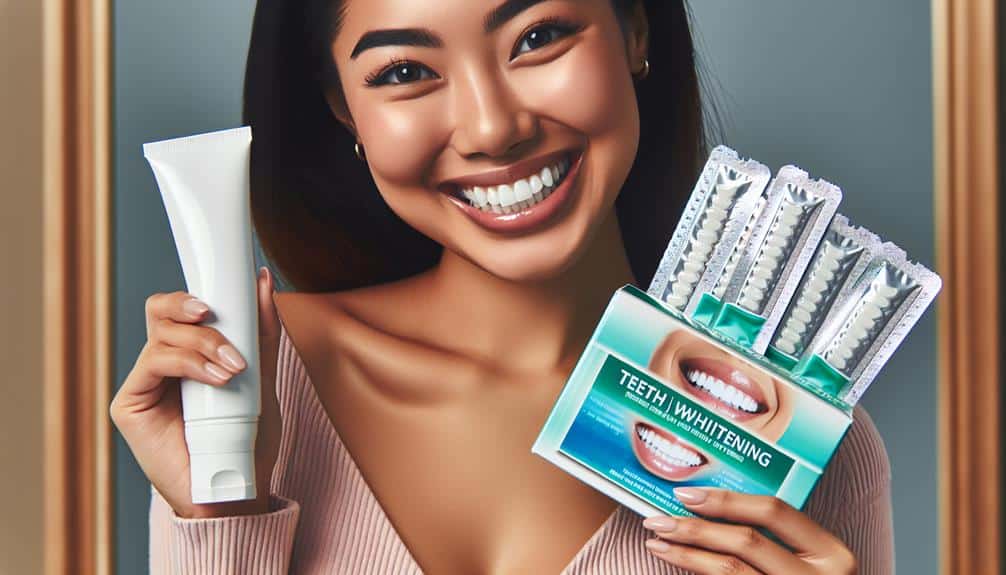To achieve a bright smile while keeping your dental health in check and avoiding sensitivity problems, finding the right teeth whitening is vital. You must consider gentle yet effective whitening methods tailored to manage sensitivity issues. Prioritize products specifically designed for sensitive teeth, such as whitening toothpaste or strips suitable for this condition. Consult with a dentist before starting any whitening treatment to make sure you make an informed choice. Remember, the key to safe and effective teeth whitening lies in selecting the most suitable products for your needs.
Key Points
- Prevents exacerbating tooth sensitivity and discomfort.
- Ensures safe and effective whitening results.
- Minimizes the risk of enamel damage.
- Maintains oral health while achieving desired brightness.
- Customizes treatment to address individual needs.
Understanding Teeth Sensitivity
If you experience sudden pain or discomfort when consuming hot or cold foods, you might be dealing with teeth sensitivity. This condition can be quite bothersome, but there are ways to prevent discomfort and manage the pain effectively.
Preventing discomfort associated with teeth sensitivity involves practicing good oral hygiene. Brushing your teeth gently with a soft-bristled toothbrush and using desensitizing toothpaste can help protect your enamel and reduce sensitivity. Avoiding acidic foods and drinks can also aid in preventing further enamel erosion, which can exacerbate sensitivity.
When it comes to managing pain from teeth sensitivity, using fluoride mouthwash can help strengthen your teeth and reduce sensitivity. Additionally, applying a thin layer of desensitizing toothpaste directly to the sensitive areas or using a fluoride gel prescribed by your dentist can provide relief. If the sensitivity persists, it's essential to consult with a dental professional to determine the underlying cause and explore further treatment options.
Causes of Tooth Sensitivity
Tooth sensitivity can be caused by various factors that lead to discomfort when consuming hot or cold foods. One common cause is exposed dentin, which is the inner layer of the tooth containing microscopic tubules that connect to the nerve endings. When dentin is exposed due to enamel erosion from acidic foods or brushing too vigorously, it can result in sensitivity. Gum recession, often caused by gum disease or aggressive brushing, can also expose the tooth roots, leading to sensitivity.
Prevention methods for tooth sensitivity include using a soft-bristled toothbrush and avoiding highly acidic foods and drinks. Fluoride toothpaste can help strengthen enamel, reducing the risk of sensitivity. Treatment options include desensitizing toothpaste that blocks the nerve signals in the teeth, fluoride varnishes applied by a dentist to strengthen enamel, or dental procedures like bonding or a gum graft to cover exposed roots. Consulting with a dental professional is crucial to determine the underlying cause of tooth sensitivity and the most appropriate treatment.
Types of Teeth Whitening Products
Experiencing tooth sensitivity can lead individuals to explore various types of teeth whitening products to enhance their smiles. When contemplating teeth whitening options, it's crucial to weigh the pros and cons of different products to achieve the desired results without compromising oral health.
Here are four key considerations:
- DIY vs Professional Whitening: DIY whitening kits are convenient and cost-effective, but professional whitening treatments performed by a dentist often yield quicker and more noticeable results due to higher concentrations of whitening agents.
- Natural vs Chemical Whitening: Natural whitening remedies like baking soda or activated charcoal are gentle on the teeth but may take longer to show results compared to chemical whitening products containing ingredients like hydrogen peroxide or carbamide peroxide.
- Whitening Toothpaste: Whitening toothpaste is a popular option for maintaining a brighter smile at home, although it may not provide significant whitening effects on its own.
- Whitening Strips: These thin, flexible strips coated with a whitening gel are convenient to use and can help whiten teeth gradually over time.
Considerations for Sensitive Teeth
Considering the sensitivity of your teeth, it's essential to carefully select teeth whitening products that prioritize gentle yet effective whitening methods. Sensitivity management is vital when choosing a teeth whitening product to make sure that the process doesn't worsen any existing sensitivity issues. Look for products specifically designed for sensitive teeth, as they often contain lower concentrations of bleaching agents like hydrogen peroxide, which can be harsh on sensitive teeth. These products are formulated to be milder while still effectively removing stains and brightening your smile.
Opt for gentle whitening techniques such as whitening toothpaste or whitening strips that are suitable for sensitive teeth. These products can help gradually whiten your teeth without causing discomfort. Additionally, consider consulting with your dentist before starting any whitening treatment to address any underlying issues that may contribute to tooth sensitivity. By being mindful of sensitivity management and choosing gentle whitening methods, you can achieve a brighter smile without compromising the health of your teeth.
Best Practices for Safe Whitening
For safe and effective teeth whitening, it's essential to adhere to best practices recommended by dental professionals. To make sure you achieve the best results without causing harm to your teeth or gums, follow these best practices:
- Proper technique: When whitening your teeth at home, make sure to carefully follow the instructions provided with the whitening product. Avoid leaving the whitening agent on for longer than recommended, as this can lead to sensitivity and enamel damage.
- Professional options: Consider consulting with a dentist for professional teeth whitening treatments. Dentists can customize the whitening procedure to your specific needs, ensuring safe and effective results.
- Regular dental check-ups: Before starting any whitening treatment, it's vital to have a dental check-up to address any underlying issues like cavities or gum disease that could be worsened by whitening agents.
- Use reputable products: Opt for whitening products that have been approved by dental associations and have a good reputation. Cheaper, unregulated products may contain harmful ingredients that can harm your teeth and gums.
Frequently Asked Questions
Can Teeth Whitening Treatments Be Harmful to Your Enamel in the Long Run?
Concerned about enamel protection from teeth whitening? It's vital to choose the right treatment for long-term effects. Consult your dentist for safe options that maintain enamel health while achieving a brighter smile.
Are There Any Natural Remedies or DIY Methods for Whitening Teeth That Are Safe for Sensitive Teeth?
When exploring DIY remedies or natural options for teeth whitening, remember to prioritize safety for sensitive teeth. Consult with a dental professional before trying any at-home solutions to guarantee they won't harm your enamel or exacerbate sensitivity.
How Long Do the Effects of Teeth Whitening Typically Last?
When it comes to whitening longevity, professional treatments typically last 6 months to 2 years with proper maintenance, while at-home options may give results lasting 1-3 months. Consistent care impacts how long your pearly whites shine.
Is It Possible to Over-Whiten Your Teeth, and What Are the Potential Consequences?
When you over-whiten your teeth, you risk damaging your enamel, leading to increased teeth sensitivity. This can occur due to over bleaching, causing long-term whitening risks and potential harm to your oral health.
Are There Any Specific Foods or Drinks That Should Be Avoided After Getting a Teeth Whitening Treatment to Maintain the Results?
After getting your teeth whitened, you should totally splurge on all the coffee, red wine, and blueberries you want. Ignore those pesky recommendations to avoid staining foods. Who needs long-lasting results anyway?



